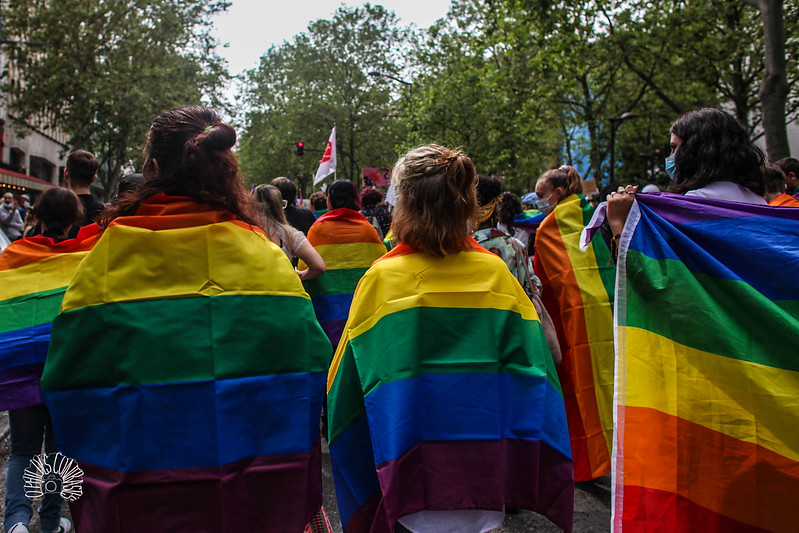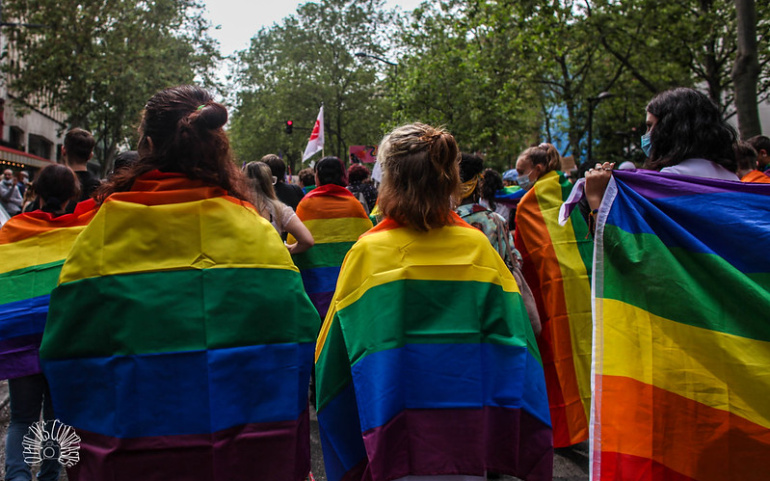This statement was written collaboratively by the queer and trans members of the ADEP team on behalf of ADEP as a whole. We use the terms “queer and trans” rather than the LGBTQ+ acronym because these terms best fit our personal identities and politics.
June is Pride Month — a time when across the U.S. and the world, queer and trans communities are gathering both to celebrate their identities and carry on their fight for liberation.
This June also marks the fifth anniversary of the Pulse massacre, when an Afghan-American man opened fire in an Orlando gay nightclub, killing 49 people and wounding 53 others. The victims were queer and trans people of color. While we can never know the perpetrator’s true motives, the Pulse massacre laid bare the tense relationship between queer and trans identities on the one hand, and our Muslim and Afghan communities on the other.
As queer and trans Afghans, we reject the narrative that queerness and transness are inherently western phenomena, while Afghan and Muslim societies are inherently homophobic and transphobic. This ideology is only useful to the western imperialist project, which uses the fear of Muslim intolerance to justify continuous military occupations, surveillance, and violence against our communities. We call on our global Afghan community to join us in rejecting this destructive set of myths by standing in solidarity with the queer and trans Afghans and Muslims who are continually used as pawns in the so-called “War on Terror.”

When the U.S. military drops drones on Afghanistan, Afghans suffer indiscriminately, including queer and trans Afghans. Across the globe, when the U.S. surveillance state targets Afghans and Muslims, queer and trans members of these communities are targeted too. Queer and trans Afghans have always known that our struggles against militarism, imperialism, islamophobia, transphobia, and state violence are inextricably tied together. This Pride Month, we are asking the rest of our community to recognize the interconnectedness of our struggles, too.
ADEP stands firmly and unequivocally for the liberation of our queer and trans community. We will no longer stand by while the existence of queer and trans Afghans and Muslims is erased. We will no longer tacitly tolerate violence perpetrated against queer and trans people, whether by the state or by members of our own community. We have come to a belated understanding that the time for moral ambiguity is long past. To our queer and trans siblings in the global Afghan community: we have failed you with our silence. We are going to fight for you.
As an organization, we are still grappling with what solidarity means. Mainstream conversations about queer and trans rights often celebrate the passive “ally”: the individual who models tolerance and views queer and trans politics from the superficial vantage point of diversity. We want to move away from mere allyship and toward solidarity by taking active part in the struggle for queer and trans liberation. If allyship is cheerleading from the sidelines, we suggest that solidarity is taking part in the fight as co-conspirators. To this end, the purpose of this statement is not only to explain our politics, but also to propose concrete steps toward joining in the struggle for queer and trans liberation. The following list is a set of actions we can all take to begin showing up for our queer and trans community:
Respect queer and trans Afghans.
- Recognize that we exist. Queer and trans Afghans have always been a part of our community, both in diaspora and in Afghanistan. The erasure of queer and trans Afghans is itself a form of violence against us.
- Acknowledge the homophobia and transphobia that exists within our community. Homophobia and transphobia bear material consequences, including loss of housing, estrangement from families of origin and the wider community, mental illness, assault, sexual violence, and death.
- Believe queer and trans people. When someone shares their identity, accept it at face value. You might have preconceived notions about what a gay, lesbian, trans, or nonbinary person looks like, but the reality will challenge your expectations. Trust the people who are living these identities every day.
- Honor the privacy of queer and trans people. Revealing someone’s identity can jeopardize their safety, so never do so without their consent.
Educate yourself on queer and trans issues.
- Seek out information independently so that queer and trans Afghans are not continually made to explain and justify their identities.
- Prioritize learning from first-person sources created by queer and trans people. We are the experts on our own experiences. Just as you would go to Afghan sources to learn about Afghanistan, go to queer and trans creators, activists, and writers to learn about their lives, identities, and political demands.
Make your solidarity known.
- Vocalize your politics so that queer and trans people know that you are a collaborator and a safe person to talk to. Most queer and trans people will not assume they have your support until you have made it explicitly known to them.
- Recognize that privilege determines the safety of participating in activism. For safety reasons, many queer and trans Afghans are not always able to advocate for themselves. If you are a straight or cisgender person, your identity affords you a level of security that many queer and trans folks may never have.
- Use your privilege to speak up, especially when queer and trans people cannot. Call out homophobia and transphobia when you hear it, especially among family and friends who are more likely to value your insight. Show up to protests, celebrations, and gatherings to help protect the queer and trans people present.
Amplify queer and trans voices and activism.
- Support the many organizations already doing the work of queer and trans liberation. This can include promoting their work on social media, donating funds, volunteering your time, and using their resources to deepen your understanding of queer and trans politics.
- Center queer and trans voices. In conversations about queer and trans issues, let us frame the conversation. Give us space to describe our own perspectives, experiences, and desires.
- Let queer and trans folks take the lead in advocating for our own liberation. We should always be the ones setting the agenda for our own movement.
These suggestions are only the beginnings of a conversation that is long overdue in our global Afghan community. ADEP is committed to furthering this conversation and deepening our understanding of what genuine, effective collaboration with our queer and trans siblings can look like. We want to hear from our Afghan, Muslim, POC, queer, and trans community in response to this statement. Please share your perspectives on how we can link our fights together and care for one another. Our struggles are deeply interconnected, and none of us are free until we are all free. Join us as we move toward solidarity.
Resources:
Muslims for Progressive Values
MASGD (Muslim Alliance for Sexual and Gender Diversity)
Fireweed Collective: QTBIPOC mutual aid support group
Blog and healing space for QTPOC artists and writers
Prospect Therapy: Free HRT and gender surgery letters


Add Comment